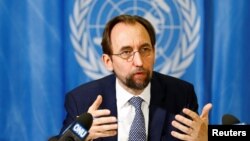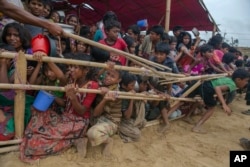The top U.N. human rights official is condemning the persecution, and widespread and systematic brutal attacks against the Rohingya in Myanmar, suggesting this treatment might verge on genocide. Lisa Schlein reports for VOA from Geneva, the site of a special session on Myanmar at the U.N. Human Rights Council.
Speaking in Geneva at a special session on Myanmar at the U.N. Human Rights Council, U.N. High Commissioner for Human Rights Zeid Ra’ad al-Hussein says genocide is a legal concept and only a competent court can determine whether the actions of the government of Myanmar against the Rohingya qualify as genocide.
But he says the many decades of violations against the Rohingya in Myanmar’s Rakhine state and the deliberate efforts to erase its ethnic identity are very troubling.
“Considering the decades of statelessness as well as systematic and systemic discrimination against the Rohingya.... Considering also that Rohingyas self-identify as a distinct ethnic group with their own language and culture, and are also deemed by the perpetrators themselves as belonging to a different ethnic, national, racial or religious group. Given all of this, can anyone, can anyone rule out that elements of genocide may be present?” asked Zeid.
Zeid noted that a staggering 626,000 Rohingya refugees have fled to Bangladesh since August to escape persecution and violence in Myanmar. No members of the international community are allowed access to northern Rakhine State, so he says it is impossible to assess the number of people who may have been detained, disappeared, killed or died on route.
He is urgently calling on the Myanmar authorities to put an immediate and absolute halt to the violence targeting the Rohingya. He also is calling for an international investigation to bring to justice the perpetrators of these crimes.
Myanmar’s response to these accusations was relatively mild given the High Commissioner’s blistering words. Myanmar’s ambassador to the United Nations in Geneva acknowledged attacks against the Rohingya by individuals. But he denied this was government policy, and said his government was doing everything possible to stop this.





